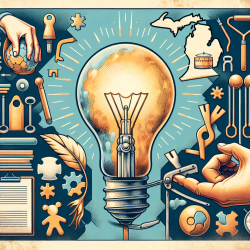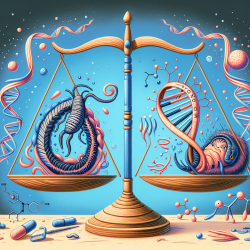Introduction
In the ever-evolving field of forensic science, diversity is not just a buzzword; it is a critical component that drives innovation and enhances outcomes. A recent study titled "Diversity in forensic sciences: Black, Indigenous, and People of Color (BIPOC) representation in different medicolegal fields in the United States" highlights the underrepresentation of BIPOC individuals in forensic sciences and related fields. This blog explores the implications of these findings and offers actionable steps for practitioners to foster diversity and improve forensic science outcomes.
The Importance of Diversity in Forensic Science
Diverse teams are known to produce more innovative solutions and have a broader impact. In forensic science, diversity can lead to advancements that enhance the justice system and public safety. However, the study reveals that BIPOC individuals are significantly underrepresented in forensic-related fields, which may hinder knowledge production and innovation.
Current Status of Diversity
The study analyzed demographic data from various sources, including professional organizations and the American Community Survey. Findings indicate that while Asian individuals are often overrepresented, Black, Hispanic, and Indigenous individuals are underrepresented in forensic science-related occupations. This lack of diversity is also evident in educational programs, with limited offerings at Historically Black Colleges and Universities (HBCUs).
Implications for Practitioners
Forensic practitioners can play a pivotal role in addressing this diversity gap. Here are some strategies to consider:
- Mentorship and Outreach: Engage in mentorship programs targeting BIPOC students and professionals. This can help bridge the gap and encourage more diverse participation in forensic science.
- Inclusive Hiring Practices: Evaluate and modify hiring practices to eliminate biases and promote diversity at all levels within organizations.
- Education and Training: Advocate for more forensic science programs at HBCUs and other minority-serving institutions. Support scholarships and internships for BIPOC students.
- Transparency and Reporting: Encourage professional organizations to report demographic statistics and develop strategies to improve representation.
Encouraging Further Research
While the study provides a comprehensive overview of the current state of diversity in forensic science, further research is needed to understand the barriers and develop effective solutions. Practitioners are encouraged to collaborate with researchers to explore these issues and contribute to the growing body of knowledge on diversity in forensic science.
Conclusion
Diversity in forensic science is not just a matter of fairness; it is essential for the advancement and integrity of the field. By actively working to improve representation and inclusivity, practitioners can help ensure that forensic science continues to evolve and serve the needs of all communities. To read the original research paper, please follow this link: Diversity in forensic sciences: Black, Indigenous, and People of Color (BIPOC) representation in different medicolegal fields in the United States.










